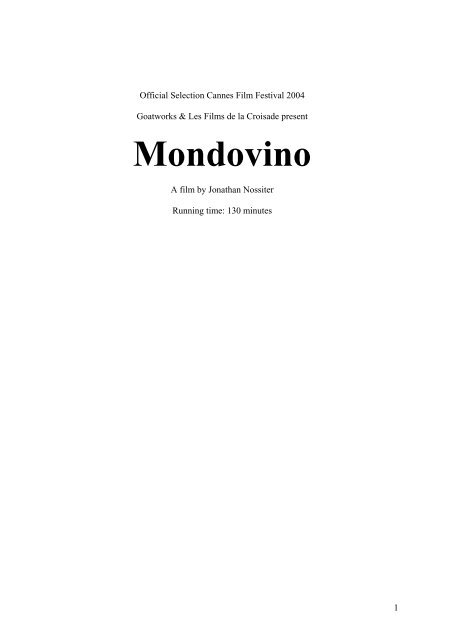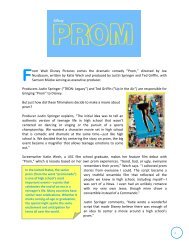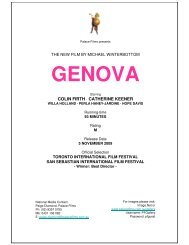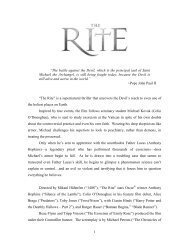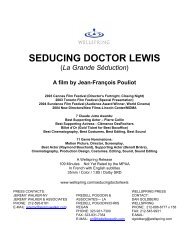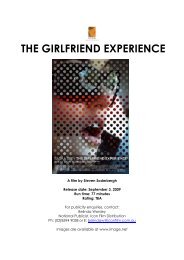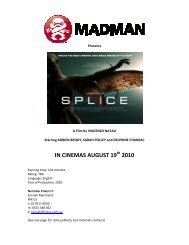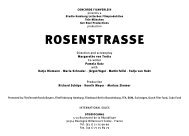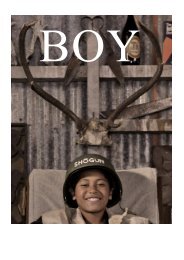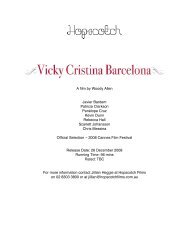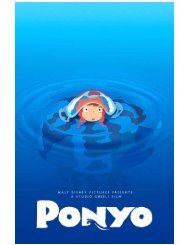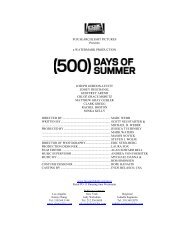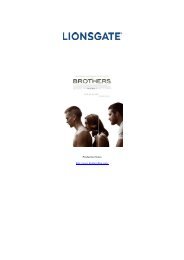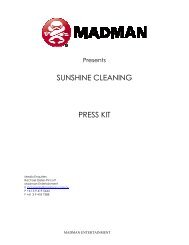Create successful ePaper yourself
Turn your PDF publications into a flip-book with our unique Google optimized e-Paper software.
Official Selection Cannes Film Festival 2004<br />
Goatworks & Les Films de la Croisade present<br />
<strong>Mondovino</strong><br />
A film by Jonathan Nossiter<br />
Running time: 130 minutes<br />
1
“Brilliant”<br />
- Vogue<br />
“Intoxicating”<br />
- New York Post<br />
“It's a vast, global soap opera - Dallas among the vines - and<br />
a very accurate mirror of the world at large.”<br />
- LA Times<br />
“Subtle, full-bodied, characterful,<br />
blessed with a long elegant finish that keeps you thinking.”<br />
- Time Out<br />
“If Sideways made you curious about vino,<br />
this fierce, funny doc opens up a world worth debating”<br />
- Rolling Stone<br />
“Like Love, Actually, how could one not love a film that is a portrait of so<br />
many interesting people as well as a portrait of an industry that faces the<br />
immense problems of commercialisation and globalisation?”<br />
- European Films.net
SYNOPSIS<br />
Across three continents, "MONDOVINO" weaves together the family succession<br />
sagas of billionaire Napa Valley power brokers, the rivalry of two aristocratic<br />
Florentine dynasties and the efforts of three generations of a Burgundian family<br />
fighting to preserve their few acres of land. But are all these struggles secondary to<br />
the exploits of a gleefully mischievious pirate from Bordeaux who spreads the gospel<br />
of modernity from Italy to New York to Argentina?<br />
Wine has been a symbol of Western civilization for thousands of years. Never has<br />
the fight for its soul been as desperate. Never has there been so much money -and<br />
pride- at stake. But the battle lines are not what you'd expect: local versus<br />
multinational, simple peasants versus powerful captains of industry. In the world of<br />
wine, it is never the usual suspects.<br />
2
CHARACTERS<br />
IN ORDER OF APPEARANCE<br />
YVONNE HEGOBURU<br />
Winemaker, Jurançon, France<br />
BATTISTA & LINA COLUMBU<br />
Winemakers, Sardinia, Italy<br />
MICHEL ROLLAND<br />
Wine consultant, Pomerol, Bordeaux, France<br />
AIMÉ GUIBERT<br />
Winemaker, “Mas de Daumas-Gassac” Aniane, France<br />
MONDAVI FAMILY<br />
Shareholders, Robert Mondavi Winery, Napa, California, USA<br />
Robert, father, founder – Margrit, his 2 nd wife – Michael, eldest son, former CEO<br />
Tim, youngest son, former co-CEO, technical director<br />
DE MONTILLE FAMILY<br />
Winemakers, Volnay, Burgundy, France<br />
Hubert, father – Étienne, son - Alix, daughter, former vinificatrice in a Boisset’<br />
subsidiary<br />
BILL HARLAN<br />
Real Estate Developer, owner, Harlan Estate, Napa, California, USA<br />
PATRICK LÉON<br />
Co-CEO and technical director Château Mouton-Rothschild, Bordeaux, France<br />
XAVIER DE EIZAGUIRRE<br />
Co-CEO, marketing director Château Mouton-Rothschild, Bordeaux, France<br />
NEAL ROSENTHAL<br />
Wine importer, New York City, USA<br />
MICHAEL BROADBENT<br />
Wine director, Christie’s, London, England<br />
JEAN-LUC THUNEVIN<br />
Founder of Château Valandraud, St-Emilion, France<br />
JEAN-CHARLES BOISSET<br />
Director, Groupe Boisset Nuits-St-George, France<br />
BERNARD MAGREZ<br />
CEO, William Pitters, Bordeaux, France<br />
FRESCOBALDI FAMILY<br />
3
Owners, Frescobaldi Spa, Florence, Italy<br />
Marchioness Bona – Marquis Vittorio, her husband CEO<br />
Marquis Dino, Vittorio’s brother, author of family history “Privilège de la<br />
Naissance”<br />
ANTINORI FAMILY<br />
Owners, Antinori Srl, Florence, Italy<br />
Piero, CEO, family business Albiera & Allegra Piero’s daughters, marketing<br />
Lodovico his brother, founder of Domaine Ornellaia<br />
SALVATORE FERRAGAMO<br />
Manager, “village d’Il Borro” Il Borro, Tuscany, Italy<br />
JAMES SUCKLING<br />
Critic “Wine Spectator Magazine” Il Borro, Tuscany, Italy<br />
MASSIMO & PATRIZIA VINCI<br />
Wine shop owners, Volterra, Tuscany, Italy<br />
ISANETTE BIANCHETTI & INALDO TEDESCO<br />
Winemakers, Pernambuco, Brazil<br />
ETCHART FAMILY<br />
Vineyard owners, domaine San Pedro de Yacochuya, Cafayate, Argentina<br />
Arnaldo x3 = father, son & grandson and Marco, youngest son<br />
ANTONIO CABEZAS<br />
Winemaker, Cafayate, Argentina<br />
4
YVONNE HEGOBURU<br />
MONDOVINO CHARACTER BIOS<br />
“I planted vines when my husband died. Ever since then, all this love inside<br />
me, I give it to the vines. I talk to them. I have an exchange with them.”<br />
YVONNE HEGOBURU, 6 1/2 hectares, Appellation Jurançon<br />
(Béarn, SW France)<br />
Yvonne planted her vines in 1986, following the death of her journalist husband, on a<br />
site where vines had been planted from at least the 16 th century. But in 1940 the<br />
vines were left to die, when the men went off to war, to Germany or into the<br />
Resistance. It was decided the slopes were too steep for even young women to<br />
cultivate. Yvonne, now 77 years old, tends the vines herself. She grows the grapes<br />
according to the principles of “Biodynamie”, which exclude the use of any<br />
chemicals, pesticides or herbicides.<br />
BATTISTA COLUMBU<br />
“We mustn’t be distracted by the phantoms of progress, which can destroy us and<br />
destroy nature, and bring suffering to others. Here in Sardinia, we have a millennial<br />
culture. We ought to live in tranquility on this earth. And there’s room for others.”<br />
BATTISTA & LINA COLUMBU, 1 1/2 hectares, Appellation Malvasia di Bosa,<br />
(Sardinia, Italy)<br />
Because the family domaine is too small to support even one person, Battista<br />
Columbu pursued a career in politics as a member of the Sardinian Party. Sardinians<br />
say that he’s the only local politician who ended his career with a house that is the<br />
same size as it was when he started.<br />
MICHEL ROLLAND, wine consultant (Pomerol, France)<br />
Considered the world’s leading wine consultant, Rolland is indisputably the most<br />
influential and highest-priced. He is technical advisor, through his Pomerol<br />
laboratory, for over 400 domaines in Bordeaux. He consults in 12 countries,<br />
including the United States for Robert Mondavi, Staglin Vineyard, and Harlan<br />
Estate, and Argentina for the Etchart Family. He is also the oenologist for many of<br />
Bernard Magrez’s properties from Bordeaux to Morocco, Algeria and Portugal,<br />
including the newly established domaine in Aniane, Languedoc. In India, he is the<br />
first person to make wine.<br />
5
AIMÉ GUIBERT<br />
“Wine is dead. Let’s be clear, wine is dead. And not just wine. Fruits.<br />
Cheeses....<br />
Wine is an almost religious relationship between man and the natural<br />
elements. With the immaterial. It takes a poet to make a great wine.”<br />
AIMÉ GUIBERT, 40 hectares, Appellation Mas de Daumas Gassac<br />
(Aniane, Languedoc, France)<br />
Guibert established domaine Daumas-Gassac in 1979, in Aniane, a village of 2,400<br />
inhabitants, when Bordeaux oenologist Henri Enjalembert discovered he had a<br />
singular terroir. Guibert is considered the pioneer of renaissance of quality<br />
winemaking in Languedoc. Even by his detractors.<br />
ROBERT MONDAVI WINERY (Napa, California)<br />
Robert Mondavi, son of an impoverished Italian immigrant from the Marche region<br />
of Italy, founded the Robert Mondavi Winery in 1966, and built it into a 1/2 billion<br />
dollar a year business. The Mondavis produce over 100 million bottles worldwide<br />
from Napa to Chile to Australia to Tuscany. His sons Michael and Tim inherited the<br />
position of joint CEOs in the early 1990s, and took the company public in 1993.<br />
Very recently, at the request of the shareholder-appointed board of directors, the<br />
family stepped down from running the company.<br />
MICHAEL MONDAVI<br />
“We want to start a dynasty. Ten, fifteen generations from now, it would be great to<br />
see our heirs making wine on some other planets. That could be kind of fun. “Beam<br />
me up, Scotty, send me some wine from Mars or something.”<br />
HARLAN ESTATE, 20 hectares (Napa, California)<br />
After developing his successful real estate business in Northern California, Bill<br />
Harlan created Harlan Estate in 1985. Michel Rolland began consulting for him in<br />
1998 (three years later he also became a consultant for the Staglins). The Harlan<br />
wine received its first top score of 100 points from Robert Parker in 1994. It is now<br />
one of the most expensive and sought-after red wines in the world, the pioneer of<br />
what the Wine Spectator Magazine terms “Cult Wines.”<br />
STAGLIN FAMILY VINEYARD, 18 hectares (Napa, California)<br />
After serving as an officer in Vietnam, Garen Staglin was appointed to the modeling<br />
committee under Henry Kissinger during the SALT talks between the US and the<br />
Soviet Union. He subsequently founded several Silicon Valley software companies,<br />
including eONE Global, worth 200 million dollars. He purchased his Napa Valley<br />
vineyards in 1985.<br />
6
GROUPE BOISSET (Burgundy, France)<br />
Founded in 1961 by 18-year-old Jean-Claude Boisset, the Boisset Group has grown<br />
into the number one company in Burgundy in sales, and the third biggest in France.<br />
Boisset’s son, Jean-Charles, is now at the helm, extending its stake in international<br />
ventures in the US, Japan and Canada.<br />
CHÂTEAU MOUTON-ROTHSCHILD (Pauillac, Bordeaux, France)<br />
A Bordeaux 2 nd Growth according to the famous 1855 classification, Château<br />
Mouton was acquired by Baron Philippe de Rothschild in 1922. In 1973, thanks to<br />
the Baron’s lobbying efforts, Mouton-Rothschild was promoted to 1 st Growth status,<br />
the only instance in history of any Bordeaux chateau managing to change status. In<br />
1979, Mouton-Rothschild allied itself with Robert Mondavi to create the first luxury<br />
Californian wine, Opus One. After Philippe’s death in 1988, his daughter Philippine<br />
de Rothschild took over.<br />
Mouton-Rothschild is headed by a three-person directoire. The co-CEOs are Patrick<br />
Léon, technical director, Xavier de Eizaguirre, marketing director and Pierre<br />
Guinchard, financial director.<br />
JEAN-LUC THUNEVIN, vigneron, 6.5 hectares, Appellation Château de Valandraud<br />
(St-Emilion, France)<br />
Jean-Luc Thunevin bought a small plot of unclassified land in St-Emilion in 1991<br />
and renamed it Chateau Valandraud. Working almost from the start with Michel<br />
Rolland, he became the first well-known “garagiste”, a term used by the most<br />
prominent advocate of Valandraud, Robert Parker, to describe producers of small<br />
quantities of highly prized, expensive wines made with what he describes as “radical<br />
viticulture.” Valandraud today sells for $300-$400 a bottle.<br />
BERNARD MAGREZ, CEO and founder, William Pitters (Bordeaux, France)<br />
Bernard Magrez founded William Pitters in 1964. Taking advantage of the boom of<br />
mass distribution in supermarkets in France, he turned the small drinks company into<br />
one of the top negociants of wine in Bordeaux. In parallel, he has developed in<br />
collaboration with Michel Rolland, activities in smaller-scale “garage” wines across<br />
France, in Algeria, Morocco, Spain and Argentina. More recently, he has acquired a<br />
plot of land in the small village of Aniane in the Languedoc, in association with<br />
Gérard Depardieu, as the spearhead for their joint venture called, “Les Clefs du<br />
Terroir”.<br />
7
HUBERT DE MONTILLE<br />
“Where there are vines, there’s civilization. There’s no barbarism.”<br />
FAMILLE DE MONTILLE, 8 hectares, Appellations Volnay, Rugiens,<br />
Pommard. (Burgundy, France)<br />
Hubert with his wife, Christine, his son Etienne and his daughters Alix and Isabelle<br />
are vignerons on 8 hectares of vines in Volnay and Pommard, Burgundy. Hubert<br />
became a trial lawyer in Dijon to supplement his income from the family domaine,<br />
which he ran simultaneously from the age of 20 (4 hectares at the time), beginning<br />
with the harvest of 1950. Etienne started making the wine with him in 1991 and has<br />
been its chief winemaker for the last few years. Alix worked as winemaker at the<br />
negociant house, Ropiteau, subsidiary of Burgundy giant, Jean-Charles Boisset until<br />
she tendered her resignation in 2003. Because the family domaine is too small to<br />
support two families, she and her brother have started a small winery label together,<br />
buying grapes from small landholders and making the wine themselves.<br />
ALIX: Whore wines come right on to you.<br />
HUBERT: They’re trickster wines.<br />
ALIX: They’re wines that come on to you. And then they drop you.<br />
HUBERT: They drop you like that!<br />
ALIX: In fact, they’re “traitor” wines.<br />
HUBERT: But the modern world is used to that. This world likes to be<br />
fooled.<br />
NEAL ROSENTHAL<br />
“In Bordeaux, the terroir is there, but they’re destroying it. They’re<br />
suppressing their terroir. Just as our freedoms are being suppressed here, in<br />
the US. People say: “let’s be patriotic, therefore let’s give up our freedoms.<br />
Let’s not debate anything anymore. Let’s just accept.”<br />
There’s a battle between resistance and collaboration. It’s not between<br />
modernity and tradition. Because you can be modern while respecting<br />
tradition.”<br />
8
NEAL ROSENTHAL, Importer, Rosenthal Wine Merchant (New York, USA)<br />
Neal Rosenthal started as a retailer with a small wine shop in upper Manhattan in the<br />
1970’s, near his father’s pharmacy. He gradually began to import the wines himself,<br />
representing artisanal winemakers from France and Italy much the way a book editor,<br />
gallerist or film producer works with an author, artist or filmmaker. He has<br />
established himself as one of the leading American importers of European wines of<br />
terroir.<br />
MICHAEL BROADBENT, Wine Director, Christie’s (London, England)<br />
A Master of Wine, author and auctioneer, Michael Broadbent has been in the wine<br />
trade for over 50 years. He has been head of the wine department at Christie’s since<br />
1966. He is the author of “Vintage Wine: 50 years of Tasting the World’s Finest<br />
Wines” and “How to Approach and Appreciate Wine.” He is widely considered the<br />
world’s most experienced taster.<br />
SCHRÖDER & SCHŸLER, Négociants (Bordeaux, France)<br />
Founded by two North German immigrants in the 18 th century, Maison Schröder &<br />
Schÿler is one of the oldest Bordeaux trading companies. Having survived numerous<br />
historic upheavals –including the French Revolution, the Napoleonic Wars and the<br />
German occupation in the 1940’s- it is now run by Jean-Henri Schÿler, his son Yann<br />
and his daughter-in-law Marie. In addition to bottling over 15 million wines a year,<br />
they own several Bordeaux Chateaux, including Chateau Kirwan (3 rd Growth) in the<br />
town of Margaux. Michel Rolland has been their consultant at Kirwan for the last<br />
few years.<br />
ROBERT PARKER<br />
“I always say about myself; if there’s a legacy for Robert Parker, it’s that he<br />
leveled the playing field. In this stratified caste system of wine, dominated<br />
by elitists and reactionaries, Robert Parker brought an American, a<br />
democratic point of view. I think that has been a revolution.”<br />
ROBERT PARKER, Wine Critic (Monkton, Maryland)<br />
After practicing law for 10 years, Robert Parker turned to wine criticism, publishing<br />
the Wine Advocate in 1978. He and his magazine were launched to international<br />
fame after his precociously favorable reviews of the unusually ripe, California-like<br />
1982 vintage in Bordeaux. Since then, Robert Parker has become indisputably the<br />
single most influential wine critic in the world, determining with his ratings the price<br />
of wine in most of the world’s regions, including the multi-billion-dollar a year<br />
Bordeaux trade.<br />
9
THE FRESCOBALDI FAMILY (Florence, Italy)<br />
Tracing the family banking business back to the 11 th century, the Frescobaldis’<br />
history is closely intertwined with the commercial, artistic and political history of<br />
Florence. The family has grown wine in Tuscany for 700 years. It is now the second<br />
most successful wine company in Tuscany, with sales averaging $50 million a year.<br />
Its current CEO, the Marchese Vittorio Frescobaldi, created numerous joint ventures<br />
with the Robert Mondavi Winery, through such brands as Ornellaia, Luce and<br />
Danzante. Today these joint ventures represent approximately a 1/3 of the entire<br />
Frescobaldi output.<br />
THE ANTINORI FAMILY (Florence, Italy)<br />
One of the oldest noble families in Florence, the Antinoris have been involved in the<br />
arts and history of Florence for 800 years. Their wine sales rank number one in<br />
Tuscany and third in all of Italy. CEO Marchese Piero Antinori is credited with the<br />
radical modernization of Tuscan wines and the successful relaunching of the image<br />
of Italians wines abroad.<br />
Lodovico Antinori, his brother, founded Ornellaia separately from the family<br />
business in the early 1990s. Planting in the historically unheralded Bolgheri region<br />
along the Tuscan coast, Ornellaia became the leader of the “post-modernist<br />
movement of Super Tuscans” (a Wine Spectator term for wines that flout the historic<br />
appellation laws). In 1998, Lodovico Antinori brought in Robert Mondavi as a<br />
minority partner and eventually sold the entire winery to the Mondavi family. He<br />
has since joined forces with his brother Piero, to develop a winery in neighboring<br />
Bibbona, Tuscany.<br />
THE BIANCHETTIS, vignerons, 6 hectares (Pernambuco, Brazil)<br />
Isanette Bianchetti and her husband Mauro Tedesco, both oenologists, emigrated<br />
from the south of Brazil (several thousand kilometers away) in the 1980’s to the<br />
valley of the “Rio de Sao Francisco” in Pernambuco state. Working for the Botticelli<br />
vineyard, they helped to establish the first vines ever planted in Northeastern Brazil,<br />
in an oasis deep in the sparsely populated backlands. Because of the proximity to the<br />
equator but with an absence of humidity, this is perhaps the only region in the world<br />
that has two and a half succesful harvests per year. They founded their own label,<br />
Bianchetti, on 6 hectares of vines in 1997. Their wine is currently sold only on the<br />
local Brazilian market and averages $2 a bottle.<br />
10
THE ETCHARTS, San Pedro de Yacochuya (Cafayate, Argentina)<br />
The Etchart winery was founded by Basque emigrants in Cafayete, Northwestern<br />
Argentina in the mid 19 th century in a region known to have produced quality wines<br />
since the Jesuits first accompanied the Spanish conquests in the 17 th century.<br />
Arnaldo Etchart (the third of five Arnaldo Etcharts) sold the family winery and the<br />
right to the family name to French multinational Pernod-Ricard in the 1990’s.<br />
Following a stint as their consultant at the previous winery, Michel Rolland founded<br />
the San Pedro de Yacochuya winery in partnership with Arnaldo and his sons,<br />
Arnaldo and Marco in 1996.<br />
ANTONIO CABEZAS, vigneron, 1 hectare (Tolombón, Argentina)<br />
Antonio Cabezas has one hectare of white Torrontes grapes and red Malbec grapes in<br />
the town of Tolombon, 5 km from Cafayete. To supplement his income of $60 a<br />
month from the wine he sells (about $1.50 per bottle), he does various odd jobs<br />
working in other people’s vineyards.<br />
11
JONATHAN NOSSITER<br />
Jonathan Nossiter has directed four feature films. His most recent, "<strong>Mondovino</strong>"<br />
premieres in Cannes in the Official Selection in May 2004. It’s both a feature film<br />
and a 10 part television series about the rich, the poor and the powerful in the world<br />
of wine, from Paraguay to Brooklyn to Florence.<br />
"Signs & Wonders" (2000), a psychological thriller shot in Athens, Greece was<br />
produced by MK2 and Nick Wechsler, with Charlotte Rampling and Stellan<br />
Skarsgard. It premiered in competition at the 2000 Berlin Film Festival.<br />
"Sunday" (1997), a black comedy he also directed and co-wrote about a one day love<br />
affair based on a case of assumed identity, starred David Suchet & Lisa Harrow. It<br />
won the Sundance Film Festival's Grand Jury Prize for Best Film and Best<br />
Screenplay and the Deauville Film Festival's Grand Prize for Best Film and their<br />
International Critics' Prize and was shown in “Un Certain Regard” at Cannes.<br />
He also directed "Resident Alien" (1991), a feature length comedy mixing<br />
documentary and fiction about the end of Manhattan’s bohemia, with Quentin Crisp,<br />
John Hurt and Holly Woodlawn. It was theatrically released in the U.S. in 1992 and<br />
was shown in numerous countries (including the BBC in England, Berlin Film<br />
Festival, Toronto Film Festival).<br />
His documentaries include "Losing The Thread" (2001) for RAI in Italy and the<br />
Sundance Channel in the US, an hour long film on art fraud, tourism and the male<br />
ego in Tuscany (premiere Rotterdam Festival) and "Searching for Arthur", a look at<br />
Arthur Penn in New York, for Telepiu's Italian series "Directors on Directors"<br />
(premiere at Locarno Festival) and “Making Mischief”, a half hour, personal<br />
documentary diary of the preparations for “Signs & Wonders”.<br />
His training includes: the study of painting at the Beaux Arts in Paris and the San<br />
Francisco Art Institute and Ancient Greek at Dartmouth College, assistant directing<br />
in English theatre (The Newcastle Playhouse, King's Head) and assistant to the<br />
director Adrian Lyne on "Fatal Attraction". A trained sommelier, he has made wine<br />
lists and trained staffs for a variety of New York restaurants, including “Balthazar”,<br />
“Rice”, “Il Buco” and “Pravda.” He has also written about wine for New York<br />
Magazine, “Wine & Food” and “The Forward”.<br />
The son of a journalist, he was born in the US and grew up in France, England, Italy,<br />
Greece and India.<br />
12
Interview with JONATHAN NOSSITER<br />
Though you’re a filmmaker, you also have a career in wine. How did<br />
that begin?<br />
For me, wine has always been linked to friendship, to pleasure. I became<br />
interested in it when I first worked as a waiter in Paris at the age of 15. Later<br />
I got a degree as a sommelier in New York, where I made wine lists for a<br />
number of restaurants. Because my father, Bernard Nossiter, was a foreign<br />
correspondent for the Washington Post and the New York Times, I grew up<br />
in France, Italy, Greece, India and in the States. Early on, I saw how he got<br />
the feel for a given country just by talking to all kinds of unlikely people.<br />
Having met winegrowers from around the world over the last 20 years, I’ve<br />
come to realize that somehow this singular world is weirdly representative of<br />
the world at large. The reason is simple. Wine is more like people, in its<br />
infinite complexity, than anything else on the planet. It’s one of the clearest<br />
expressions of both the Judeo-Christian and Greco-Roman traditions. And<br />
rather than preserving these traditions as rigid artifacts, it keeps them fluid,<br />
vital and modern. Wine really is a kind of guardian of Western Civilization.<br />
To look at the world of wine today is necessarily a way to look at how we<br />
feel about our past and at what we’re preparing for the future. The news from<br />
the front, in my eyes, is both exhilarating and terrifying.<br />
Who are winemakers?<br />
A winegrower is at once a farmer, a businessman and an artist. His<br />
attachment to the earth is simple and humbling, dependent as he is on the<br />
cruel whims of nature. But at the same time that he works the land, the wine<br />
that he fashions is linked to the greatest cultural ambitions –and pretensions-<br />
of his time. And like an artist, he tries to give pleasure and provoke<br />
exchanges between people. However the great difference between the two is<br />
that the work the winegrower pours his soul into is necessarily ephemeral. It<br />
avoids the artist’s trap that Orson Welles warned against: "the only thing<br />
more vulgar than working for money is working for posterity."<br />
Do you see wine reflecting cultural changes?<br />
Absolutely. For example, it's not a coincidence that there was a wine boom<br />
in the States in the 1970’s. Californian wine at that time was sometimes<br />
excessive, too intense or even challenging to swallow. But it was intriguing,<br />
radical and invigorating. Winegrowers then shared the same desire for<br />
discovery and experimentation as Cassavetes, Scorcese or Coppola of the<br />
period. In the 80s, with the arrival of the Reagan era, wine immediately<br />
began to change. Overnight this previously raw and unpredictable liquid<br />
became polished and media-savvy: easy drinking wines in fancy packages.<br />
Wines that were designed for reasons of prestige and economic power. I<br />
don’t think it’s accidental that at the same time in Hollywood, films became<br />
more complacent...unapologetically commercial products. The small<br />
Californian wineries from the 70s that resembled the Burgundians in their<br />
13
artisanal ambitions began to sell out to big business. Coca Cola bought<br />
Sterling Vineyards in the 80s. A decade later, Coca Cola sold the winery to<br />
Diageo, an even more multinational company, exactly when it became absurd<br />
to talk about the idea of “a country of origin”, an identity, for a global<br />
company. I think that the next stage of evolution, what we’re living through<br />
today, is the voluntary co-opting of small scale artisanal production (“organic<br />
farming”, “terroir” etc.) into the cultural and economic needs of the new<br />
world order.<br />
Is this what you had in mind from the start, an inventory of the global<br />
order?<br />
No. The origins and what remains the heart of the film are much more<br />
personal. I set off with a friend of mine, the Uruguayan filmmaker Juan<br />
Pittaluga, to do a kind of casting of winegrowers from different regions. As<br />
Juan and I began to talk winemakers in Burgundy, we were both struck by the<br />
intensity of father-son relationships and how that intensity expressed itself, in<br />
love and tension, in the production of something tangible.<br />
Naturally we began to think about our dads, both of whom died quite young<br />
but having left behind powerful expressions of their love and their<br />
engagement with the world around them. The notion of personal<br />
transmission from generation to generation, of what gets passed on and what<br />
dies away...or is lost...or is consciously rejected, became, for me, the grail of<br />
this adventure across three continents.<br />
What was especially exciting was that in almost every encounter my own<br />
preconceptions were turned on their head. Someone who declares himself a<br />
conservative, a reactionary even, turns out to be more fundamentally radical<br />
and progressive than a family who votes “left” and espouses a bag full of<br />
notions associated with “resistance”.<br />
Why did you choose Burgundy as your starting point?<br />
I spoke about California, but what happened in Burgundy in the 70’s was just<br />
as interesting from a political and economic standpoint. Burgundian<br />
winegrowers at the time were very isolated from the economic and cultural<br />
pressures of the modern world. Their wine had been appreciated for<br />
thousands of years –at least since the Romans invaded Gaul- but they had<br />
long dropped out of fashion. Wanting to join the emerging global<br />
marketplace, they succumbed to all the trends of the time, including the<br />
indiscriminate use of chemical fertilizers, herbicides and pesticides.<br />
Miraculously, their attachment to the land and to their culture was so strong<br />
that they quickly discarded these toxic expressions of progress and<br />
concentrated instead on finding personal ways to express their patrimony in a<br />
modern idiom, to create a vital bridge between an ancient culture and the<br />
world they live in today.<br />
They quickly understood that they were trying to protect a simple, universal<br />
idea, expressed most clearly for me by a Sardinian winegrower, Battista<br />
14
Colombu who said: "The most critical act in a deceitful world that tries to<br />
destroy our individual dignity at every turn, is to protect that dignity at any<br />
cost.”<br />
You have opened the doors of a very private club. How were you<br />
welcomed into the world of wine?<br />
Very well, even by those who didn't share my ideas. There’s a natural<br />
conviviality in the world of wine. Even those people who produce wine for<br />
the least idealistic reasons find it difficult to resist the kind of natural<br />
seduction that comes out of the bottle. There really is a magic that occurs in<br />
the natural transformation of grapes into wine. And even though it’s true that<br />
the world of wine has been veiled for too long by a kind of “omerta”, or vow<br />
of silence, anyone who drinks or makes wine is instinctively gregarious.<br />
Did you set out on your adventures as a wine lover, an insider?<br />
More as a "discoverer," I’d say. I've always tried to avoid the snobbery of<br />
wine connoisseurship...all that ridiculous jargon about the “aromas of pear<br />
blossom or...the scent of my grandmother’s lace underwear...” Unfortunately<br />
wine has become associated with all of the most exclusive aspects of a certain<br />
lifestyle. Especially in places that are not traditional winegrowing cultures,<br />
like the US, England and the Far East, wine has become a kind of symbol of<br />
elitism and pretension. I’ve always tried to fight against that.<br />
Whenever I make a wine list for a restaurant and train the staff, I insist that<br />
they describe the wine in their own terms, from their own gut reactions. You<br />
shouldn’t fake your way through a bottle of wine any more than an actor<br />
should fake his emotions. Even the most inexperienced drinker or spectator<br />
can immediately spot a phony approach. For the film, I wanted to get as<br />
close as I could to a general spectators’ point of view, to people who couldn’t<br />
give a damn about wine but who are sensitive to simple, everyday pleasures<br />
that are somehow essential to our basic enjoyment of life. I think the<br />
traditions of these pleasures are in fact essential to our survival as a culture<br />
Are there two opposing worlds, between the wine growers who maintain<br />
traditional, cultural and rural values, and those who support the<br />
globalization of wine, what some call “the international taste”?<br />
No, I don't see it like that. I've tried to avoid a simplification of the struggle<br />
between the good and the bad and make a film that both takes a stand but is<br />
fiercely tolerant of opposing views. It’s a notion I know my father stood for.<br />
For me, “Resistance” is an ethical, not an ideological position. In the world<br />
of wine, like in France under Vichy, those who resist come from all social<br />
and economical classes and all ideologies. While few people’s lives are in<br />
danger today, I think there’s a more subtle form of repression in the world<br />
that makes the notion of resistance and collaboration much more ambiguous.<br />
Whether you’re a reporter or a civil servant, a doctor or a shopkeeper, there<br />
are choices in everyday life that determine how you conform or question the<br />
uses of power around you. These same struggles are present for winemakers,<br />
15
from the far reaches of Argentina to the palazzos of Florence.<br />
You introduce us to Michel Rolland, a famous oenologist who works with<br />
major wine houses in twelve countries. Who is this man really?<br />
Rolland is like the Spielberg of the wine world, as Jean-Luc Thunevin –<br />
Rolland’s colleague and Robert Parker’s protege- suggests in the film.<br />
Rolland is a pure expression of his era, as even his adversary, Aimé Guibert<br />
admits. He instinctively understands the trends and aspirations of his time<br />
and knows how to capture them in a product that anticipates what consumers<br />
will accept. He’s the best known winemaker in the world beyond any doubt.<br />
While I was deep in the heart of Argentina finishing up the film, I expected<br />
someone to possibly bring up his name, but I never imagined I’d hear<br />
someone say, “Michel Rolland completely transformed Argentinian wine and<br />
now, thanks to him, it’s completely different from what it’s been since the<br />
Jesuits first introduced wine here in the 17th century.” He’s like a highly<br />
successful business or political consultant, perfectly adapted to the global<br />
marketplace.<br />
How have the Californian wines from Napa managed to establish<br />
themselves so strongly?<br />
In the 15th and 16th centuries, great Florentine families like the Medicis and<br />
the Strozzis supported poets and painters as a way of affirming their own<br />
social and political positions. Today, art has been abandoned as a symbol of<br />
prestige in favor of wine. It’s more prestigious in an international society to<br />
have your name on a wine label than to have your portrait made by a painter<br />
or photographer, or even a filmmaker.<br />
Since the end of the 80s, Californian wine has imposed itself on the global<br />
marketplace not only in terms of sales but also in terms of influence on wine<br />
production elsewhere in the world, including in countries like France and<br />
Italy.<br />
Your film is almost like a 19th-century novel, with an epic cast of<br />
characters from high Bordeaux society to humble pioneers in the<br />
Brazilian backwoods.<br />
During the shoot, I realized it was like being in some kind of Dickens or<br />
Balzac novel. I tried to adapt how I directed to reflect this. There was such<br />
an enormous range of people from all cultures and social, economic and<br />
ideological backgrounds, with all the pretensions (and humble aspirations)<br />
that the post-industrial world can offer. Because of the vividness of these<br />
people, often felt like I was working with a international cast of great actors.<br />
16
Is all this specific to the world of wine?<br />
I loved the idea of sharing with a viewer the thrill of seeing these private lives<br />
that often felt like they had the intensity of fiction. Maybe because the wine<br />
world is so inconsequential in real terms in the world, I had unusual access to<br />
its leaders and power brokers. I think it allowed me to reveal the human face<br />
of globalisation, to film with unusual intimacy the emotions and psychology<br />
of those who wield power and influence.<br />
It seems to be a world where the sky’s the limit. The Mondavi brothers<br />
picture themselves creating a dynasty that could have wine growing on<br />
Mars!<br />
It’s strange. Like in a novel, their own ambitions have turned against them.<br />
It’s as if the wine world has blended Balzac’s world of “Lost Illusions,” with<br />
the TV series “Dallas” with the Mexican soap opera, “Pueblo Chico, Infierno<br />
Grande” (Small Village, Big Hell). Very recently, the board of directors of<br />
the publicly traded Mondavi corporation replaced the family in the running of<br />
their own company. What the Mondavi brothers set in motion a decade ago<br />
by aggressively going public and competing in the global marketplace has<br />
come back to bite them. The empire that their father so painstaking built up<br />
from nothing is no longer in their hands.<br />
According to Alix de Montille, “you make wine as a reflection of who you<br />
are.”<br />
Absolutely true. I almost put in the end credits: “whatever you think of any<br />
given character is exactly what you’ll think about the wine they make.”<br />
Do we make films as a reflection of who we are?<br />
Probably. Inevitably. Maybe fatally. I went at this subject matter in the<br />
same way I tried to make my other films, without making any distinction<br />
between “fiction” and “documentary.” In the fiction films I’ve done, I’ve<br />
always tried to provoke the actors into a vital exchange with the environment<br />
in which we shot, from David Suchet with the homeless shelter in Queens to<br />
Stellan Skarsgard with a herd of goats in the Greek mountains. With<br />
<strong>Mondovino</strong> I tried to prod these non actors into the fullest, most vivid<br />
expression possible of who they actually are. It was like working with actors<br />
towards the same goal, but by opposite means.<br />
I shot over the course of nearly two years, with a rare sense of delight. I hope<br />
that my previous experience shooting feature films in 35mm gave me the<br />
necessary discipline and craft sense to fully exploit the freedom and<br />
spontaneity of the new lightweight digital technology. Thanks to the<br />
pioneering work of Tommaso Vergallo at Digimages, the 35 mm end result<br />
feels closer to me to the texture of 35 mm films of the 70's -the period I love<br />
the most in colour filmmaking - than anything I've done before.<br />
It was also a conscious decision on my part to shoot with two friends, the<br />
Uruguayan director Juan Pittaluga and the Caribbean-Brazilian photographer,<br />
17
Stephanie Pommez. I think the energy of three curious friends showing up<br />
with a discreet camera as opposed to a self conscious film crew with defined<br />
objectives and working parameters allowed for an unusually human exchange<br />
between camera and subject. I feel like the camera itself became an extension<br />
of who I am and of what and how I perceived the worlds that I encountered.<br />
I’ve always operated the camera a lot in the films I’ve made, but never with<br />
so much sense of intimacy and joy of discovery. Even if the camera seems<br />
like it had a little too much to drink at times. I’m all for clear-headed<br />
engagement, but I’d hate to imagine a world without a little drunkenness.<br />
FEATURE FILMS<br />
JONATHAN NOSSITER FILMOGRAPHY<br />
MONDOVINO (2004), Director, Producer, DP, Editor.<br />
SIGNS & WONDERS (2000), Director, Co-writer<br />
Cast Charlotte Rampling, Stellan Skarsgar<br />
Official Selection Berlin Film Festival 2000<br />
SUNDAY (1997), Director, Co-writer, Producer<br />
Cast David Suchet & Lisa Harrow<br />
Best Film and Best Screenplay, Sundance Film Festival, 1997<br />
Best Film and International Critics’ Prize, Deauville Film Festival, 1997<br />
RESIDENT ALIEN (1991), Director, Writer, Producer<br />
Cast Quentin Crisp, John Hurt, Sting<br />
Winner, Florence Film Festival, 1991<br />
DOCUMENTARIES & SHORTS<br />
LOSING THE THREAD (2002), Director, Co-Producer<br />
Cast Lorenzo Pezzatini<br />
MAKING MISCHIEF (2001), Director, Producer<br />
Cast Charlotte Rampling, Stellan Skarsgard<br />
SYMPATHY FOR THE DISTRIBUTOR (2000), Director<br />
Cast Stellan Skarsgard, Charlotte Rampling<br />
Toronto Film Festival<br />
MONTREAL TRUST (2000), Director, Montreal Film Festival<br />
SEARCHING FOR ARTHUR (1997), Director<br />
Cast Arthur Penn<br />
18
Directing, Photography, Editing<br />
Jonathan Nossiter<br />
Associate Producer, Sound, 2nd Camera<br />
Juan Pittaluga<br />
Assistant & Co-Camera Operator<br />
Stephanie Pommez<br />
Assistant to Director, Associate Producer<br />
Laurent Gorse<br />
PRODUCTION CREDITS:<br />
A Production of<br />
Goatworks Films & Les Films de la Croisade<br />
Producer<br />
Emmanuel Giraud & Jonathan Nossiter<br />
Co-Producers<br />
Sophie Dulac Productions, Ricardo Preve<br />
Executive Producer<br />
Tommaso Vergallo<br />
Line Producer<br />
Catherine Hannoun<br />
Production Manager<br />
Francois Drouot<br />
Post Production<br />
Digimage (Angelo Cosimano, Juan Eveno)<br />
Sound Mixer<br />
Nostradine Benguezzou<br />
Colorist<br />
Guillaume Lips<br />
Languages English, French, Italian, Spanish, Portuguese<br />
Format: 1:85/Color- Dolby SR - Running time: 130 minutes<br />
19


